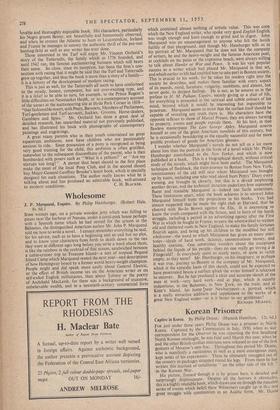Wholesome
J. P. Marquand, Esquire. By Philip Hamburger. (Robert Hale. 8s. 6d.) SOME winters ago, on a private wooden jetty which was falling to pieces near the harbour of Nassau, under a coral-pink house perhaps with a Spanish name which he had rented for the season in the Bahathas, the distinguished American author Mr. John P. Marquand told me how to write a novel. I cannot remember everything he said, for his advice, such as to have a beginning and an end but no plot, and to know your characters from birth to death down to the ties they wore at-different ages long before you write a word about them, is like the rainbow in the cocktail of that season, sandwiched between a cabin-cruiser trip to Treasure Island—a sort of tropical Pequod Island Camp which Marquand rented the next year—and descriptions of how Hemingway boxed by a former world heavy-weight champion. People might and did speak more easily about General Electric, or the effect of British income tax on the American writer or on self-exiled English millionaires, than about Tolstoy or the poetry of Archibald MacLeish, for there was a background of excessive, unbelievable wealth, and in a twentieth-century commercial form which contained almost nothing of artistic valve. This was corn which the New England writer, who spoke very good English English was tough enough and keen enough to grind and to digest. John Marquand was an encouragement to anyone who felt the lavish futility of that playground, and though Mr. Hamburger tells us in his portrait of Mr. Marquand that he does not like the company of writers, he and the heavy-weight and the famous American poet, at cocktails on the patio or the expensive beach, were always willing to talk about Hamlet or War and Peace. It was his vast popular success as a writer which had placed Mr. Marquand in that set, and which earlier in life had enabled him to take part in Boston society. This is crucial to his work, for he takes his readers right into the society he describes, and makes them familiar with every aspect of its moods, mind, furniture, vulgarity, snobbism, and almost, but never quite, its deepest feelings. He is not, as he assures us in the preface to H. M. Fulham, Esquire, merely giving us a slice of life, for everything is presented in the satirical and subtle colours of his mind, beyond which it would be interesting but impossible to penetrate. Marquand seems to insist that the surface itself should be capable of revealing any truth there is. His characters have the opposite reflexes to those of Marcel Proust; they are always turning to property, events and people outside them. At his best, in that flawless masterpiece The Late George Apley, Marquand asserts himself as one of the great American novelists of this century, but he is occasionally bewildering as the equally successful and far more prolific producer of goods for American glossies.
I wonder whether Marquand 's novels do not tell us a lot more about him than the portrait in the form of a novel which Mr. Philip Hamburger contributed to the New Yorker, and which is now published as a book. This is a biographical sketch, without critical study of the novels, which might have been useful. The Marquand technique of flashback, the train-journey to Boston from New York, reminiscences of the old mill near where Marquand was brought up by aunts, including one who read aloud from Pepys' Diary every evening, are brought in cleverly, but this is a device employing another device, and the technical imitation underlines how supremely fluent and readable Marquand is—indeed too facile sometimes. These limitations apart, what the book achieves is to unravel John Marquand himself from the projections in his books. You had almost suspected that he made the right club at Harvard, that he cheered with Bo-Jo Brown against the Elis. It is interesting to know the truth compared with the fiction, and to learn of the harsh struggle, including a period in an advertising agency after the First War in which he fought in France, to earn the wherewithal to replant old and shattered roots in New England, to make the family fortunes flourish again, and bring up his children to the modified but still wholesome—the word to which Marquand has given so many over- tones—ideals of hard work, decency, unostentatious money, and healthy exercise. One sometimes wonders about the exceptions behind the façade of his people—does no one really go wrong a la Fitzgerald? Is everybody quite as nicely nasty, or quite as richly empty, as they seem? Mr. Hamburger, on his imaginary, or perhaps it was true, journey to Boston in the company of Mr. Marquand, which is the episodic basis of this sketch, could not be expected to have penetrated below a surface which the writer himself is reluctant to uncover. But he has produced a clear and accurate sketch of the man at work—very hard work—and at play, which is equally industrious, in the Bahamas, in New Fork, on the train, and at Kent's Island, his home ;pear Newburyport—a portrait which is a really attractive addition and supplement to the works of a great New England writer—or is it better to say gentleman?
RICHARD Mt/KPI I Y.


































 Previous page
Previous page